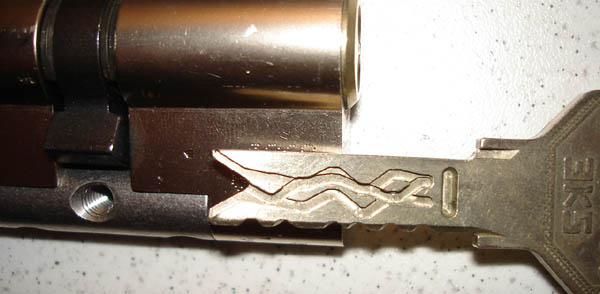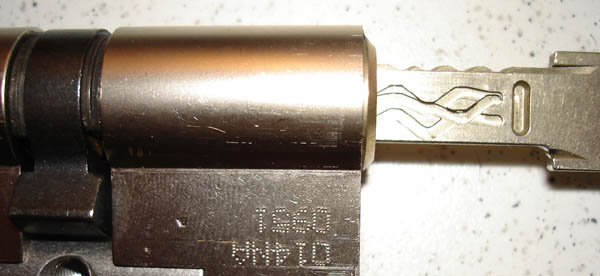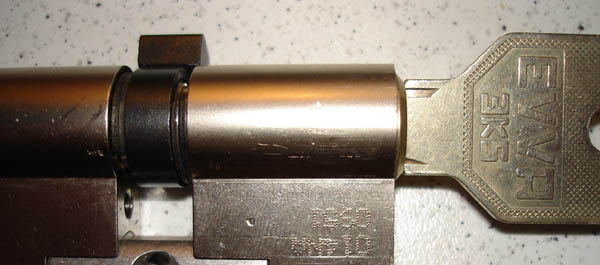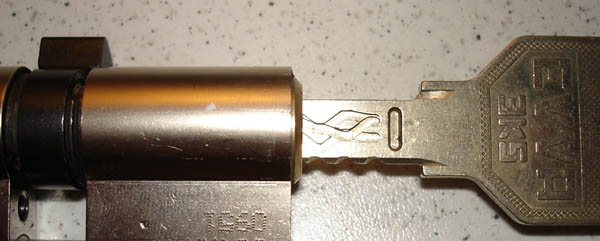(* I am recovering from the flu, will try to re-write this posting and shoot some video of it when I feel better)
Oli mailed me enthusiastically with a trick he heard from a locksmith
when I was in Barcelona.
Unfortunately it is not a trick to open an EVVA 3KS lock. I believe
the 3KS lock is one of the most decent locks ever made. Virtually
impossible to open without damaging it, hard to drill and keys that
are very secure against unauthorized duplication.
And EVVA is improving the design of this lock all the time.
The proof of that statement is at the end of this posting ….
The story that came to me was that you could add an extra layer of
‘master key’ protection to a standard 3KS lock by removing some
material of the key.
Normally you can only withdraw a working key after full rotation of the
key in the lock. However, if you remove the top layer of one side of
the key, you can remove it after 180 degree rotation. This will keep the
lock in a very odd state. The lock is still locked, yet will not allow
a non modified key entrance to the lock. Only a key that is filed flat
on one side will be allowed entrance and can open (or close) the lock
when it is in this ‘180 degree state’.
At first this might not sound like a big deal. But it is a nice way
for a store owner to lock (or open) his shop and he is the only one
that can operate the lock. Or at least it will give him the power to
deny otherwise valid keys entry to the lock. I would not call this a
bug or design error, but a nice feature.
Here are some of the pictures Oli send me:
Step 1) The EVVA 3KS lock and the modified key. Normally there is a ‘wave’
on the top and bottom of the sides of the key. But now on
one side this ‘wave’ is completely filed down.

Step 2) Key with flat filed part is inserted in the lock, flat side
facing downward. Take a close look at the black ‘follower’ that is in
the down position on this picture.

Step 3) Turn Key 180 degrees. You can see the black follower now is
aimed upwards.

Step 4) Remove key. Now the flat side is on the top side. In this
state, original, non-modified keys can not be inserted into the lock.
Only a key that is flat on one side can be inserted and operate the lock.

I was glad to receive the images from Oli and decided to shoot some
video on this subject. I took one of my new EVVA 3KS locks and started
to file away on the key. However, no matter what I tried I could not
remove my key after 180 degrees. I did try many things, yet the lock I
have can not be opened this way. So I will call my contact at EVVA
tomorrow and ask his opinion on this. My guess is they improved the
lock in the meanwhile and it is no longer possible on newer models.
I wanted to shoot some photos of the internals of a 3KS lock to show
you why there is a relief profile on the sides of the key and why this
trick works on the older generation 3KS locks. Unfortunately my
digital photo camera is not available till the end of this week. So I
could not shoot the images yet. Will do so at the end of the week.
To be continued …

pardon the newb… but have you any ideas why removing this feature would be an improvement? – was the lock more vulnerable in it’s ‘180 degree locked’ position?
maybe it’ll be clarified by the pictures
My guess, why you can’t remove the key in 180 degree position, is as follows:
The sidebars, wich are holding the key while turning, are not symmetric. In 0 degree position the sidebars are not in 90 and 270 degree position, but, lets say, in 95 and 265 degree on their widest part. When you turn to 180 degree position, the two bars can’t spread enough to release the key.
Greets, Julian
As you mention that the 3KS is hard to drill –
are you aware of the fact that it has a rather wide open keyway, which allows insertion of abrasive tools such as a saw (or a file or the rotary versions of them), and that the plug is actually very thin in areas accessible to such tools?
Cheers,
mh